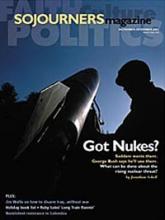Poor people on the Caribbean coast of Colombia recently blocked streets to express their dissent against a recently privatized electric company. Such acts of protest take place every day in Colombia. But social resistance does not make the newsonly the violence, which disproportionately affects the poor, takes priority.
Even then the violence is presented as if it was unrelated to Colombia's economic and social injustice. Instead of decreasing, violence grows and is used in turn to justify more military aid. The escalation of violence hides increased repression and the criminalization of social opposition, even to the point of assassinating those who resist. The security plan of President Álvaro Uribe fits perfectly into the cycle: Guerrilla violence reaches new heights, and state-sponsored violence grows with it.
Simultaneously, U.S. military aid to Colombia has increasedwith authorization to use it against the guerrilla forces. Fast-track trade authority was established to give George W. Bush the power to approve free trade agreements without congressional review. The Andean Trade Preferences Actwhich increased corporate power under the guise of trade benefitswas extended. And while we saw accounting and financial scandals on Wall Street and wide fluctuations in the stock market, the United States granted unusual credit agreements to Uruguay to avoid the collapse of its banking system, and the International Monetary Fund loaned Brazil $30 billion with onerous repayment conditions.
Read the Full Article
